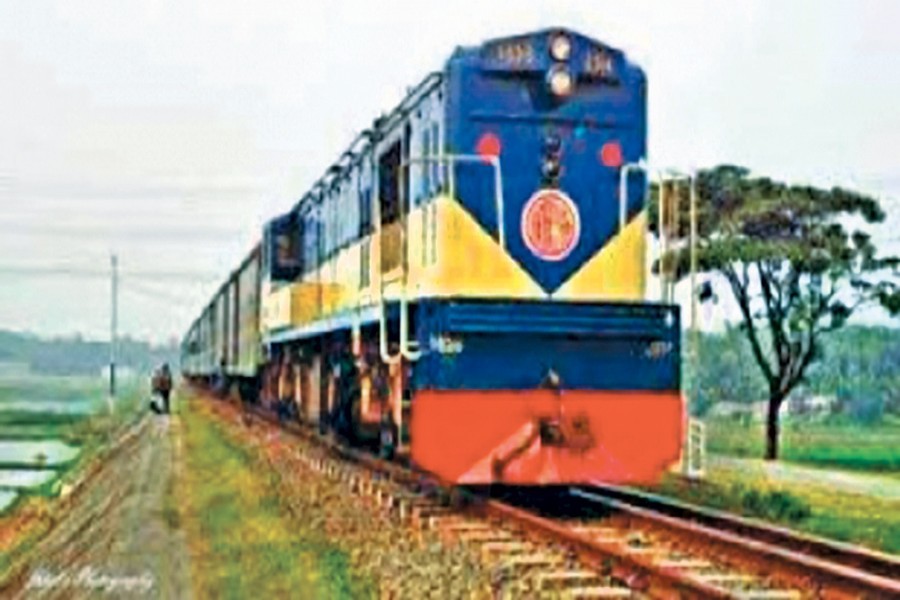Bangladesh Railway (BR) completed the revision of its master plan with an investment proposal of Tk 5.10 trillion until 2045 for making the train system efficient in both cases of passenger and freight services.
Sources said the revised railway master plan was submitted to the Ministry of Railway recently for taking necessary measures to get government approval.
The plan was finalised after sharing with all the stakeholders and reviewing the reports, they added.
"There were some observations by the ministry on the final draft submitted by the consultants in October last year, but resolved after reviewing," said an official.
He said the authorities tried to make the latest plan up-to-date based on the last master plan, which was approved in 2013 but prepared in 2010.
The BR's first master plan was prepared with old data of 2005-06 and without sufficient studies that resulted in different problems in setting priorities.
It proposed to implement 235 projects with investment plan of Tk 2.3 trillion in four five-year phases till 2030.
However, revision of the master plan was recommended within two years of the approval and was supposed to be completed in early January 2017.
The BR sent back the final draft at that time to the consultants due to innumerable flaws in it.
Finally the consultants worked under the Asian Development Bank's funded project submitted the updated master plan in October 2017.
Officials said the railway master plan 2017 has proposed to divide its development plan from all aspect in total five phases till 2045 -- each with five-year tenure.
Priorities have also been proposed in the planned projects, they added.
They said there are projects to increase the rail track efficiency, gradual upgradation and conversation to metre gauge to broad gauge, improve carriage and locomotive maintenance capacity, develop institutional capacity, train and freight operational capacity as well as find options of introducing electric trains or high speed train on some priority routes during the period.
All these were proposed to increase transportation share of railway with other transports, mainly road, as it remained ignored for long, the officials added.
The latest plan proposed to review the projects and set priority every few years.
Sources said that though highest priority among all projects has been given to construct dedicated railway bridge over Jamuna river, the master plan has not included the Padma Bridge Rail Link project as priority. Even it was not included in the first five-year tenure.
Officials said priority to setting high-speed trains on Dhaka-Chittagong corridor and Joydevpur-Dhaka-Narayanganj route have been proposed to be included later, after getting the results of feasibility study.
Sources, however, criticised the move as the master plan failed to recommend the BR as the world latest railway service provider due to not being able to assess the need of converting or installing standard gauge rail track.
Though most Asian countries, including India and Vietnam, have now the broad gauge train services, China has already turned into standard gauge.
The consistency in the rail track with other neighbouring countries is necessary to establish regional corridors as BR has signed agreement to be a part of trans-Asian railway as well as other regional blocks.
According to the master plan, the highest investment plan equivalent to Tk 1.48 billion will be required during a period of 2016-2020 for implementing 84 projects.
In the second phase (2021-25), Tk 762.45 billion investment proposal was recommended for implementing 67 projects.
The master plan is guided by different national vision and documents, including national land transport policy, seventh five-year plan, vision 2021, national integrated multi-modal transport policy and BR's own vision.
BR has now 2,877.10 km route across two zones divided by Jamuna river. BR conversion plan from MG to BG is to allow higher speed services for removing constraints in trade with other regional countries.
BR carried 2.55 million tonnes of freight during 2014-15 which was much lower than its turnover of 4.8 million tonnes in 1970. The master plan has set the target to increase freight traffic from two million tonnes to 18 million tonnes by 2045.
It would also increase the share of Payra Port by 32 per cent by 2045, distributing the share of Chittagong Port which is now carries 98 per cent share of rail container services.


